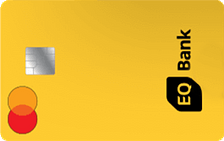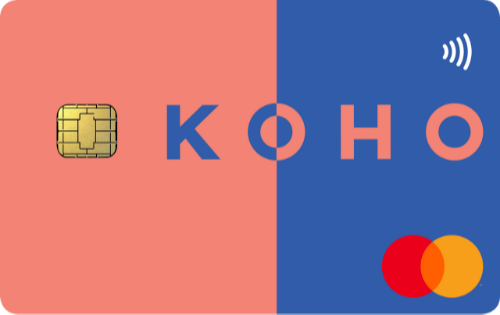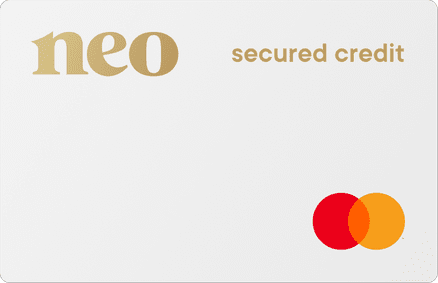Best prepaid credit cards in Canada
Updated: July 17, 2024
We Canadians love our credit cards, but they aren’t right for everyone.
Enter the prepaid credit card: An excellent payment alternative if you’d like to limit your spending and minimize debt, or if you simply don’t have the credit score to qualify for a regular credit card.
A good prepaid card today can be more than just a means of making purchases; the cream of the crop might earn cash back or rewards, offer budgeting tips, and protect you from identity fraud.
Prepaid cards are often confused with secured credit cards, and though these two card types do have some overlap in functionality, they also differ in key ways. Here are some of Canada’s best prepaid cards right now.
Best reloadable prepaid credit card in Canada
EQ Bank Card

3.0
Fair
Suggested credit scoreto receive the latest news, tips and offers by email
Eligibility
Fair
Recommended Credit Score
$0
Required Annual Personal Income
$0
Required Annual Household Income
Recommended Credit Score
Fair
Required Annual Personal Income
$0
Required Annual Household Income
$0
0.5%
cash back on purchases
2.5%
interest on your balance
cash back on purchases
0.5%
interest on your balance
2.5%
0.00%
Purchase APR
$0
Annual Fee
0.00%
Foreign Transaction Fee
Purchase APR
0.00%
Annual Fee
$0
Foreign Transaction Fee
0.00%
Eligibility
Fair
Recommended Credit Score
$0
Required Annual Personal Income
$0
Required Annual Household Income
Recommended Credit Score
Fair
Required Annual Personal Income
$0
Required Annual Household Income
$0
0.5%
cash back on purchases
2.5%
interest on your balance
cash back on purchases
0.5%
interest on your balance
2.5%
0.00%
Purchase APR
$0
Annual Fee
0.00%
Foreign Transaction Fee
Purchase APR
0.00%
Annual Fee
$0
Foreign Transaction Fee
0.00%
Why we picked the EQ Bank card as the best prepaid credit card in Canada
While relatively new to the credit card game, the EQ Bank card is an immediate hit.
The bank known for its "no fees" gives you a prepaid card that will reimburse any ATM fees you get charged. No more driving around trying to find your preferred bank to avoid the fees. Drive to any ATM and use it without charges.
Speaking of fees, while Mastercard is known for its global acceptance, the EQ Bank card charges no fees, zero, zilch, nada, nothing on foreign transaction fees. So while you shop abroad, know that you're saving about 2.5% on every single purchase that most other cards charge.
You can load up to $10,000 on this card, but you will need an EQ bank account. Fear not, EQ Bank is one of the best banks in Canada. Why? They give you 2.5% on your money in the account. Unheard of for a savings/chequing hybrid account. Setup direct deposit and you can get up to 4% cash back on, well, not only money in your account, but it also applies to any cash you have on your card. A whopping 4%?! That bests the stock market on some days.
Oh, and one more thing, you'll also earn 0.5% cash back on every purchase you make with this card.
Gotta love EQ.
Read our EQ Bank review
Best prepaid credit card to build credit
Koho Mastercard

3.9
Poor
Suggested credit scoreto receive the latest news, tips and offers by email
Pros
-
A no-fee account option
-
Earn up to 5% cash back on your purchases
-
Accepted worldwide, wherever Mastercard is accepted
-
Four account tiers, so there’s something for everyone
-
Earn interest on your account
-
RoundUps feature helps you save
-
Financial coaching is available
-
Features like Credit Building (to help you build your credit history) and Cover (to protect you from overdrawing your account)
-
Compatible with Apple Pay
-
Joint account option for families and couples
Cons
-
No physical branches or tellers
-
No RRSP, TFSA or RESP accounts
-
Customer service not on par with the big banks
-
Missing some banking features, like wire transfers, currency exchanges and multiple lines of business like financial planning, mortgages and insurance
Eligibility
Poor
Recommended Credit Score
$0
Required Annual Personal Income
$0
Required Annual Household Income
Recommended Credit Score
Poor
Required Annual Personal Income
$0
Required Annual Household Income
$0
1%
cash back on groceries and transportation
3%
interest earned on your account balance
cash back on groceries and transportation
1%
interest earned on your account balance
3%
0.00%
Purchase APR
0.00%
Cash Advance APR
$0
Annual Fee Option to add credit building (price available in app)
Purchase APR
0.00%
Cash Advance APR
0.00%
Annual Fee
$0
Pros
-
A no-fee account option
-
Earn up to 5% cash back on your purchases
-
Accepted worldwide, wherever Mastercard is accepted
-
Four account tiers, so there’s something for everyone
-
Earn interest on your account
-
RoundUps feature helps you save
-
Financial coaching is available
-
Features like Credit Building (to help you build your credit history) and Cover (to protect you from overdrawing your account)
-
Compatible with Apple Pay
-
Joint account option for families and couples
Cons
-
No physical branches or tellers
-
No RRSP, TFSA or RESP accounts
-
Customer service not on par with the big banks
-
Missing some banking features, like wire transfers, currency exchanges and multiple lines of business like financial planning, mortgages and insurance
Eligibility
Poor
Recommended Credit Score
$0
Required Annual Personal Income
$0
Required Annual Household Income
Recommended Credit Score
Poor
Required Annual Personal Income
$0
Required Annual Household Income
$0
1%
cash back on groceries and transportation
3%
interest earned on your account balance
cash back on groceries and transportation
1%
interest earned on your account balance
3%
0.00%
Purchase APR
0.00%
Cash Advance APR
$0
Annual Fee Option to add credit building (price available in app)
Purchase APR
0.00%
Cash Advance APR
0.00%
Annual Fee
$0
Why we picked the KOHO prepaid Mastercard
It's the best prepaid card for cash back lovers, but it's super helpful to build your credit.
The KOHO Prepaid Mastercard® is the best prepaid option if you’re looking to stay on budget while still earning rewards.
KOHO has 3 plans: $4/month, $9/month, and $19/month. Your cash back improves at each level, but you'll always earn 5% interest on your account balance and extra cash back back at participating merchants (they're updated regularly, so check the app)
Like EQ Bank card, KOHO charges no foreign transaction fees, but you may face fees if you withdraw from some ATMs.
KOHO acts like a cash back card in that you earn cash back on Groceries, Transportation, food and drink from 1% to 1.5% to 2% based on your plan.
KOHO offers credit building services at $10, but with the Extra plan you get 30% off (so, $7) and with the Everything plan you get 50% (so, $5).
Key features:
Perks: Cash back, earn even more cash back at select partnered merchants, no fees for most transactions, Roundup feature to seamlessly save extra money.
Withdraw fees: KOHO itself does not charge any fees, but you could be charged depending on the out-of-network fee charged by the ATM.
Spending limits: $3,000 daily limit.
Interest: Earn up to 2.00% on account balance if you set up direct deposit.
Annual fee: No annual, but monthly fees: $4/month for essential, $9/month for Extra, and $19/month for their everything plan.
Learn more by reading our complete KOHO review.
Best free prepaid credit card
Neo Secured Credit Card

4.0
$25 on signup
Welcome offerPoor
Suggested credit score$25 customer sign up bonus welcome offer
Pros
-
No annual fee
-
Low minimum security deposit
-
Cash back rewards on purchases
-
Instant approval regardless of credit score
Cons
-
Only reports to TransUnion
-
High APR range
Eligibility
Poor
Recommended Credit Score
$0
Required Annual Personal Income
$0
Required Annual Household Income
Recommended Credit Score
Poor
Required Annual Personal Income
$0
Required Annual Household Income
$0
15%
Up to 15% on first new purchases with Neo partners
5%
With Neo Partners
1%-3%
on gas and groceries
3%-4%
Streaming, ridesharing, and food delivery services
2%-3%
With retail partners
0.5%
On everything else
Up to 15% on first new purchases with Neo partners
15%
With Neo Partners
5%
on gas and groceries
1%-3%
Streaming, ridesharing, and food delivery services
3%-4%
With retail partners
2%-3%
On everything else
0.5%
19.99% - 29.99%
Variable APR
22.99% - 31.99%
Cash Advance APR Plus a $2.50 fee in Canada, $5 fee anywhere else
$0
Annual Fee Option to pay $4.99/month for premium membership to unlock higher cash back rewards
Variable APR
19.99% - 29.99%
Cash Advance APR
22.99% - 31.99%
Annual Fee
$0
Pros
-
No annual fee
-
Low minimum security deposit
-
Cash back rewards on purchases
-
Instant approval regardless of credit score
Cons
-
Only reports to TransUnion
-
High APR range
Eligibility
Poor
Recommended Credit Score
$0
Required Annual Personal Income
$0
Required Annual Household Income
Recommended Credit Score
Poor
Required Annual Personal Income
$0
Required Annual Household Income
$0
15%
Up to 15% on first new purchases with Neo partners
5%
With Neo Partners
1%-3%
on gas and groceries
3%-4%
Streaming, ridesharing, and food delivery services
2%-3%
With retail partners
0.5%
On everything else
Up to 15% on first new purchases with Neo partners
15%
With Neo Partners
5%
on gas and groceries
1%-3%
Streaming, ridesharing, and food delivery services
3%-4%
With retail partners
2%-3%
On everything else
0.5%
19.99% - 29.99%
Variable APR
22.99% - 31.99%
Cash Advance APR Plus a $2.50 fee in Canada, $5 fee anywhere else
$0
Annual Fee Option to pay $4.99/month for premium membership to unlock higher cash back rewards
Variable APR
19.99% - 29.99%
Cash Advance APR
22.99% - 31.99%
Annual Fee
$0
Why we picked the Neo Money card
Direct access to your money, plus high interest and instant cash back
The Neo Money card is similar to prepaid cards, but without the hassle of reloading funds to spend online or in-store. Instead, this card allows you full access to the balance you already hold in your Neo Everyday account, one of the best high-interest savings accounts in Canada (earning a high 2.25%, interest earned daily).
With the Neo Money card, there’s no limit to the instant cash back you can earn and it’s yours to spend however you like. First-time purchases at Neo partners get up to 15% cash back and following that you’ll earn an advertised 5% cash back on average (varies depending on partner and current offers) at 10,000+ partners.
It’s the best of both worlds here: you’re earning high interest when you don’t spend (on your balance with your Neo Everyday account) and high cash back when you do spend (with your Neo Money card), allowing you to double your earning potential.
Key features:
Perks: Grow your savings with high interest earned daily on every dollar and earn instant unlimited cash back at 10,000+ partners.
Withdraw fees: Withdraw from any ATM worldwide with no fees from Neo’s side.
Loading & spending limits: The Neo Money card uses your existing Neo Everyday balance so there’s no manual reload to worry about when spending online or in-store.
Fees: Free everyday transactions and no monthly fees.
Best cashback prepaid credit card
Wealthsimple Cash card

Poor
Suggested credit scoreto receive the latest news, tips and offers by email
Pros
-
Earn 1% cash back on all purchases
-
Choose whether your cash back goes to your investments or crypto or cash account
-
Earn up to 5% on your balance
-
No foreign exchange fees
-
No annual fees
Cons
-
No insurance
-
Will not reimburse ATM fees
Eligibility
Poor
Recommended Credit Score
$0
Required Annual Personal Income
$0
Required Annual Household Income
Recommended Credit Score
Poor
Required Annual Personal Income
$0
Required Annual Household Income
$0
4%
Earn at least 4% on your account balance
1%
Get 1% cash back on all purchases
0%
There are no foreign exchange fees
Earn at least 4% on your account balance
4%
Get 1% cash back on all purchases
1%
There are no foreign exchange fees
0%
$0
Annual Fee
0.00%
Foreign Transaction Fee
Annual Fee
$0
Foreign Transaction Fee
0.00%
Pros
-
Earn 1% cash back on all purchases
-
Choose whether your cash back goes to your investments or crypto or cash account
-
Earn up to 5% on your balance
-
No foreign exchange fees
-
No annual fees
Cons
-
No insurance
-
Will not reimburse ATM fees
Eligibility
Poor
Recommended Credit Score
$0
Required Annual Personal Income
$0
Required Annual Household Income
Recommended Credit Score
Poor
Required Annual Personal Income
$0
Required Annual Household Income
$0
4%
Earn at least 4% on your account balance
1%
Get 1% cash back on all purchases
0%
There are no foreign exchange fees
Earn at least 4% on your account balance
4%
Get 1% cash back on all purchases
1%
There are no foreign exchange fees
0%
$0
Annual Fee
0.00%
Foreign Transaction Fee
Annual Fee
$0
Foreign Transaction Fee
0.00%
Why we picked the Wealthsimple Cash card
Honestly, it's me. I'm a Wealthsimple client. I now earn 4.5% interest on my balance.
There's no foreign transaction fees and you earn 1% cash back.
You can put that cash back towards your investments like your TFSA or RRSP, or simply put it back into your cash account.
How do prepaid cards work?
Like traditional debit and credit cards, prepaid cards can be used to make online and in-person purchases, or to withdraw cash from an ATM. They’re a great asset for budgeting, because you load a prepaid card with whatever amount of money you wish and can’t spend beyond that amount until you load the card again. For example, if a cardholder adds $500 to a prepaid card and spends $200 on a hotel reservation or night out, then they can spend a maximum of $300 more before the card becomes unusable and must be reloaded.
Some other key things to remember about prepaid cards include:
- They’re not debit cards. Prepaid cards are sometimes mistakenly referred to as ‘prepaid debit cards.’ A prepaid card is not interchangeable with a debit card, however, as unlike a debit card a prepaid card is not connected to a checking account.
- They’re not credit cards. The term ‘prepaid credit card‘ is also thrown around quite a bit, but prepaid cards do not work like credit cards, as their purchases are not subject to interest charges and their use is not reported to credit bureaus. Spending with a prepaid card therefore has no influence on your credit score, positive or negative.
- There’s no free lunch. While a prepaid card might not charge an annual fee, it’s still intended to make a profit for its issuer and may charge fees to load money onto the card, make ATM withdrawals, etc. Be sure to read the fine print.
Related: How to create the perfect budget
Where to buy prepaid cards
A wide variety of Canadian financial institutions offer prepaid cards today, including some of the Big 5 banks, as well as a number of newer competitors. The easiest way to get a prepaid card is to apply for it online (check out our links above) and receive it by mail—this will likely be the only way to receive prepaid cards issued by smaller institutions. Bigger banks may issue their prepaid cards in person at a branch, and they may require you to have a bank account with them as a prerequisite to get their prepaid card.
Most (but not all) prepaid card issuers require cardholders to be at least the age of majority in their province. Requirements other than that are scant, which make prepaid cards a viable payment solution for those with a shaky credit history, or those with no credit history at all.
Related: Tips on building credit history for new immigrants
Prepaid credit card pros and cons
Pros
-
Facilitates easy cashless payments
-
No credit check for approval
-
No interest charged on purchases
-
Helps with sticking to a budget, because you can never spend more than what you’ve loaded onto the card.
Cons
-
Will not improve your credit score
-
Some charge fees for loading funds, ATM withdrawals, etc.
-
Typically earn less rewards/cash back and have fewer value-added features than top unsecured credit cards
Prepaid card vs secured credit card
Here’s a table to help summarize the differences between prepaid cards and secured credit cards:
| Item | Prepaid Card | Secured Credit Card |
|---|---|---|
| Fees | Likely no annual fee, but fees may be charged to reload the card or make ATM withdrawals | May or may not have an annual fee + fees for cash advances, foreign transactions, etc. |
| Credit Limits | You can only spend whatever amount you add to the card | Your security deposit becomes the card’s credit limit |
| Credit Score | Will not affect your credit score | Will affect your credit score |
| Interest Rates | Purchases are deducted immediately; you can’t carry a balance | You can carry a balance and thus can be subject to interest rates |
Should you get a prepaid card?
Even if you count yourself among those who prefer to be unbanked, these days it’s virtually impossible to make all your transactions in cash. Prepaid cards can be a fitting middle ground if you’ve sworn off credit and debit cards, but still want the convenience of cashless payments. A prepaid card can also be a useful tool for those who’ve had chronic problems repaying their credit card balances and are planning to set stricter limits on their spending.
That said, if you’re looking to set spending limitations and simultaneously improve your credit score, you might elect to go with a secured credit card.
Summary: Best prepaid cards in Canada
| Credit Card | Card Type | Card Features | Annual Fee |
|---|---|---|---|
| EQ Bank card | Prepaid | No fees, Up to 4% cash back on your balance | $0 |
| KOHO | Prepaid | 0.25%-2% cash back on purchases and easy savings | $0 (Easy) or $84 (or $9/month) (Extra) / year |
| Neo Money card | Functions as a Prepaid | Earn an average of 5% instant, unlimited cash back and 2.25% interest on every dollar in your account | $0 |
| Wealthsimple Cash | Prepaid | Earn 1% cash back and up to 5% interest on your balance. | $0 |
Related Articles:

Sandra MacGregor has been writing about finance and travel for nearly a decade. Her work has appeared in a variety of publications like the New York Times, the UK Telegraph, the Washington Post, Forbes.com and the Toronto Star.

Tyler Wade has worked in personal finance for over 5 years writing for brands like Ratehub, Forbes, KOHO, and now Money.ca.
Prepaid cards
Prepaid cards
Disclaimer
The content provided on Money.ca is information to help users become financially literate. It is neither tax nor legal advice, is not intended to be relied upon as a forecast, research or investment advice, and is not a recommendation, offer or solicitation to buy or sell any securities or to adopt any investment strategy. Tax, investment and all other decisions should be made, as appropriate, only with guidance from a qualified professional. We make no representation or warranty of any kind, either express or implied, with respect to the data provided, the timeliness thereof, the results to be obtained by the use thereof or any other matter. Advertisers are not responsible for the content of this site, including any editorials or reviews that may appear on this site. For complete and current information on any advertiser product, please visit their website.





